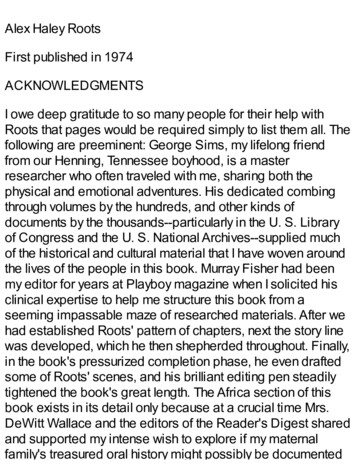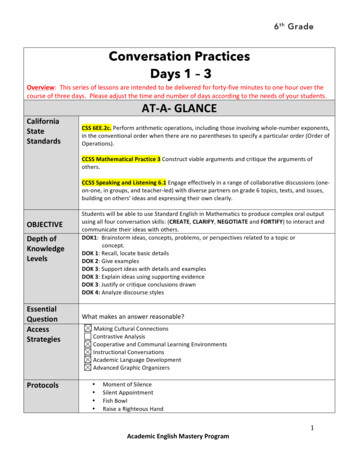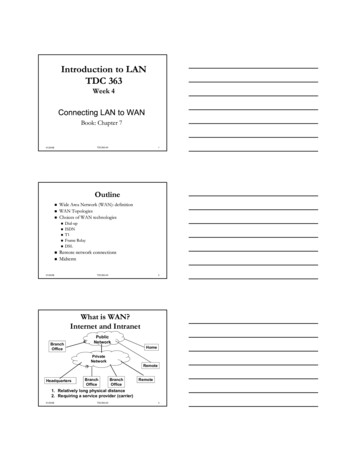
Transcription
Alex Haley RootsFirst published in 1974ACKNOWLEDGMENTSI owe deep gratitude to so many people for their help withRoots that pages would be required simply to list them all. Thefollowing are preeminent: George Sims, my lifelong friendfrom our Henning, Tennessee boyhood, is a masterresearcher who often traveled with me, sharing both thephysical and emotional adventures. His dedicated combingthrough volumes by the hundreds, and other kinds ofdocuments by the thousands--particularly in the U. S. Libraryof Congress and the U. S. National Archives--supplied muchof the historical and cultural material that I have woven aroundthe lives of the people in this book. Murray Fisher had beenmy editor for years at Playboy magazine when I solicited hisclinical expertise to help me structure this book from aseeming impassable maze of researched materials. After wehad established Roots' pattern of chapters, next the story linewas developed, which he then shepherded throughout. Finally,in the book's pressurized completion phase, he even draftedsome of Roots' scenes, and his brilliant editing pen steadilytightened the book's great length. The Africa section of thisbook exists in its detail only because at a crucial time Mrs.DeWitt Wallace and the editors of the Reader's Digest sharedand supported my intense wish to explore if my maternalfamily's treasured oral history might possibly be documented
family's treasured oral history might possibly be documentedback into Africa where all black Americans began. Nor wouldthis book exist in its fullness without the help of those scoresof dedicated librarians and archivists in some fifty-sevendifferent repositories of information on three continents. Ifound that if a librarian or archivist becomes excited with yourown fervor of research, they can turn into sleuths to aid yourquests. I owe a great debt to Paul R. Reynolds, doyen ofliterary agents--whose client I have the pleasure to be--and toDoubleday Senior Editors Lisa Drew and Ken McCormick, allof whom have patiently shared and salved my frustrationsacross the years of producing Roots. Finally, I acknowledgeimmense debt to the griots of Africa--where today it is rightlysaid that when a griot dies, it is as if a library has burned tothe ground. The griots symbolize how all human ancestry goesback to some place, and some time, where there was nowriting. Then, the memories and the mouths of ancient elderswas the only way that early histories of mankind got passedalong. for all of us today to know who we are.CHAPTER 1Early in the spring of 1750, in the village of Juffure, four daysupriver from the coast of The Gambia, West Africa, a manchild was born to Omoro and Binta Kinte. Forcing forth fromBinta's strong young body, he was as black as she was,flecked and slippery with Binta's blood, and he was bawling.The two wrinkled midwives, old Nyo Boto and the baby'sGrandmother Yaisa, saw that it was a boy and laughed withjoy. According to the forefathers, a boy firstborn presaged the
special blessings of Allah not only upon the parents but alsoupon the parents' families; and there was the pridefulknowledge that the name of Kinte would thus be bothdistinguished and perpetuated. It was the hour before the firstcrowing of the cocks, and along with Nyo Boto and GrandmaYaisa's clatterings, the first sound the child heard was themuted, rhythmic bompabompabomp of wooden pestles as theother women of the village pounded couscous grain in theirmortars, preparing the traditional breakfast of porridge thatwas cooked in earthen pots over a fire built among threerocks. The thin blue smoke went curling up, pungent andpleasant, over the small dusty village of round mud huts as thenasal wailing of Kajali Demba, the village alimamo, began,calling men to the first of the five daily prayers that had beenoffered up to Allah for as long as anyone living couldremember. Hastening from their beds of bamboo cane andcured hides into their rough cotton tunics, the men of thevillage filed briskly to the praying place, where the alimamoled the worship: "Allahu Akbar! Ashadu an lailahailala!" (Godis great! I bear witness that there is only one God! It was afterthis, as the men were returning toward their home compoundsfor breakfast, that Omoro rushed among them, beaming andexcited, to tell them of his firstborn son. Congratulating him, allof the men echoed the omens of good fortune. Each man,back in his own hut, accepted a calabash of porridge from hiswife. Returning to their kitchens in the rear of the compound,the wives fed next their children, and finally themselves. Whenthey had finished eating, the men took up their short, benthandled hoes, whose wooden blades had been sheathed with
metal by the village blacksmith, and set off for their day's workof preparing the land for farming of the ground nuts and thecouscous and cotton that were the primary men's crops, asrice was that of the women, in this hot, lush savanna country ofThe Gambia. By ancient custom, for the next seven days,there was bui a. singic task with which Omoro would seriouslyoccupy himself: the selection of a name for his firstborn son. Itwould have to be a name rich with history and with promise,for the people of his tribe--the Mandinkas--believed that achild would develop seven of the characteristics of whomeveror whatever he was named for. On behalf of himself and Binta,during this week of thinking, Omoro visited every household inJuffure, and invited each family to the naming ceremony of thenewborn child, traditionally on the eighth day of his life. On thatday, like his father and his father's father, this new son wouldbecome a member of the tribe. When the eighth day arrived,the villagers gathered in the early morning before the hut ofOmoro and Binta. On their heads, the women of both familiesbrought calabash containers of ceremonial sour milk andsweet munko cakes of pounded rice and honey. Karamo Silla,the jaliba of the village, was there with his tan-tang drums; andthe alimamo, and the arafang, Brima Cesay, who would someday be the child's teacher; and also Omoro's two brothers,Janneh and Saloum, who had journeyed from far away toattend the ceremony when the drum talk news of theirnephew's birth had reached them. As Binta proudly held hernew infant, a small patch of his first hair was shaved off, aswas always done on this day, and all of the women exclaimedat how well formed the baby was. Then they quieted as the
jaliba/began to beat his drums. The alimamo said a prayerover the calabashes of sour milk and munko cakes, and as heprayed, each guest touched a calabash brim with his or herright hand, as a gesture of respect for the food. Then thealimamo turned to pray over the infant, entreating Allah togrant him long life, success in bringing credit and pride andmany children to his family, to his village, to his tribe--and,finally, the strength and the spirit to deserve and to bring honorto the name he was about to receive. Omoro then walked outbefore all of the assembled people of the village. Moving tohis wife's side, he lifted up the infant and, as all watched,whispered three times into his son's ear the name he hadchosen for him. It was the first time the name had ever beenspoken as this child's name, for Omoro's people felt that eachhuman being should be the first to know who he was. The tantang drum resounded again; and now Omoro whispered thename into the ear of Binta, and Binta smiled with pride andpleasure. Then Omoro whispered the name to the arafang,who stood before the villagers. "The first child of Omoro andBinta Kinte is named Kunta!" cried Brima Cesay. As everyoneknew, it was the middle name of the child's late grandfather,Kairaba Kunta Kinte, who had come from his nativeMauretania into The Gambia, where he had saved the peopleof Juffure from a famine, married Grandma Yaisa, and thenserved Juffure honorably till his death as the village's holyman. One by one, the arafang recited the names of theMauretanian forefathers of whom the baby's grandfather, oldKairaba Kinte, had often told. The names, which were greatand many, went back more than two hundred rains. Then the
jaliba pounded on his tan-tang and all of the people exclaimedtheir admiration and respect at such a distinguished lineage.Out under the moon and the stars, alone with his son thateighth night, Omoro completed the naming ritual. Carryinglittle Kunta in his strong arms, he walked to the edge of thevillage, lifted his baby up with his face to the heavens, andsaid softly, "Fend kiting dorong leh warrata ka iteh tee."(Behold--the only thing greater than yourself.CHAPTER 2It was the planting season, and the first rains were soon tocome. On all their farming land, the men of Juffure had piledtall stacks of dry weeds and set them afire so that the lightwind would nourish the soil by scattering the ashes. And thewomen in their rice fields were already planting green shootsin the mud. While she was recovering from childbirth, Binta'srice plot had been attended by Grandma Yaisa, but now Bintawas ready to resume her duties. With Kunta cradled acrossher back in a cotton sling, she walked with the other women-some of them, including her friend Jankay Tou- ray, carryingtheir own newborns, along with the bundles they all balancedon their heads--to the dugout canoes on the bank of the villagebelong, one of the many tributary canals that came twistinginland from the Gambia River, known as the Kamby Bolongo.The canoes went skimming down the belong with five or sixwomen in each one, straining against their short, broadpaddles. Each time Binta bent forward to dip and pull, she feltKunta's warm softness pressing against her back. The air was
heavy with the deep, musky fragrance of the mangroves, andwith the perfumes of the other plants and trees that grewthickly on both sides of the belong. Alarmed by the passingcanoes, huge families of baboons, roused from sleep, beganbellowing, springing about and shaking palm-tree fronds. Wildpigs grunted and snorted, running to hide themselves amongthe weeds and bushes. Covering the muddy banks, thousandsof pelicans, cranes, egrets, herons, storks, gulls, terns, andspoonbills interrupted their breakfast feeding to watchnervously as the canoes glided by. Some of the smaller birdstook to the air--ring- doves, skimmers, rails, darters, andkingfishers--circling with shrill cries until the intruders hadpassed. As the canoes arrowed through rippling, busypatches of water, schools of minnows would leap up together,perform a silvery dance, and then splash back. Chasing theminnows, sometimes so hungrily that they flopped right into amoving canoe, were large, fierce fish that the women wouldclub with their paddles and stow away for a succulent eveningmeal. But this morning the minnows swam around themundisturbed. The twisting belong took the rowing womenaround a turn into a wider tributary, and as they came intosight, a great beating of wings filled the air and a vast livingcarpet of seafowl-yhundreds of thousands of them, in everycolor of the rainbow--rose and filled the sky. The surface of thewater, darkened by the storm of birds and furrowed by theirnapping wings, was flecked with feathers as the womenpaddled on. As they neared the marshy faros wheregenerations of Juffure women had grown their rice crops, thecanoes passed through swarming clouds of mosquitoes and
then, one after another, nosed in against a walkway of thicklymatted weeds. The weeds bounded and identified eachwoman's plot, where by now the emerald shoots of young ricestood a hand's height above the water's surface. Since thesize of each woman's plot was decided each year by Juffure'sCouncil of Elders, according to how many mouths eachwoman had to feed with rice, Binta's plot was still a small one.Balancing herself carefully as she stepped from the canoewith her new baby, Binta took a few steps" and then stoppedshort, looking with surprise and delight at a tiny thatch-roofedbamboo hut on stilts. While she was in labor, Omoro hadcome here and built it as a shelter for their son. Typical ofmen, he had said nothing about it. Nursing the baby, thennestling him inside his shelter, Binta changed into the workingclothes she had brought in the bundle on her head, and wadedout to work. Bending nearly double in the water, she pulled upby the roots the young weeds that, left alone, would outgrowand choke the rice crop. And whenever Kunta cried, Bintawaded out, dripping water, to nurse him again in the shadowof his shelter. Little Kunta basked thus every day in hismother's tenderness. Back in her hut each evening, aftercooking and serving Omoro's dinner, Binta would soften herbaby's skin by greasing him from head to toe with shea treebutter, and then--more often than not--she would carry himproudly across the village to the hut of Grandma Yaisa, whowould bestow upon the baby still more cluckings and kissings.And both of them would set little Kunta to whimpering inirritation with their repeated pressings of his little head, nose,ears, and lips, to shape them correctly. Sometimes Omoro
would take his son away from the women and carry theblanketed bundle to his own hut--husbands always residedseparately from their wives--where he would let the child'seyes and fingers explore such attractive objects as the saphie charms at the head of Omoro's bed, placed there to wardoff evil spirits. Anything colorful intrigued little Kunta-especiallyhis father's leather huntsman's bag, nearly covered by nowwith cowrie shells, each for an animal that Omoro hadpersonally brought in as food for the village. And Kunta cooedover the long, curved bow and quiver of arrows hangingnearby. Omoro smiled when a tiny hand reached out andgrasped the dark, slender spear whose shaft was polishedfrom so much use. He let Kunta touch everything except theprayer rug, which was sacred to its owner. And alone togetherin his hut, Omoro would talk to Kunta of the fine and bravedeeds his son
had established Roots' pattern of chapters, next the story line was developed, which he then shepherded throughout. Finally, in the book's pressurized completion phase, he even drafted some of Roots' scenes, and his brilliant editing pen steadily tightened the book's great length. The Africa section of thisFile Size: 2MBPage Count: 917











